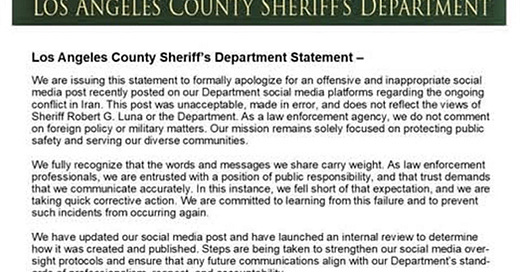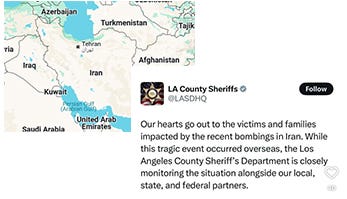Stick to the Mission: Public Agencies Aren’t Foreign Policy Voices
A public safety agency posting about a global event can quickly create problems. That's what happened when the Los Angeles County Sheriff's Department tweeted a statement calling Iranians "victims of bombings." It was deleted hours later. The backlash forced a public apology.
This incident wasn't just a PR mistake. It was a breakdown in judgment and process. Public agencies aren't positioned to comment on international matters. You represent your local community. That's where your focus should remain.
Why It Matters
You control the message. When your agency posts something that crosses into foreign affairs, you step outside your mission. The LASD tweet wasn't reviewed or approved by top leadership. That lack of control turned one tweet into a national controversy.
The tweet's language also implied a political stance on an active global conflict. That's not your lane. The public looks to your agency for safety updates, not foreign policy opinions.
Public Expectations Are Local
Your audience is your community. Your community expects facts, updates, and service, not hot takes on war zones. You're not an ambassador. You're not the White House. And you don't speak for the nation.
When a public safety agency makes a statement about a foreign conflict, it confuses the public and risks alienating part of your community. People perceive it as overstepping, especially if it appears as though you're taking sides.
Only the Agency Head Should Speak on Sensitive Topics
When a sensitive issue needs to be addressed, the message must come from the top. That means your sheriff, chief, or city manager, not the agency's main account, and not a staff-level communicator acting independently.
Only executive leaders carry the authority to speak in moments that carry diplomatic, political, or moral weight. They're also accountable for those messages.
Social Media Mistakes Erode Trust
Mistakes online aren't just embarrassing; they damage relationships. When posts feel politically charged or tone deaf, your credibility takes a hit. Trust doesn't rebuild overnight.
In a place like Los Angeles, with deep immigrant communities, missteps like the LASD tweet do real harm. Messaging like that divides rather than connects.
Posts Like This Are Legally Risky Too
Official speech from government accounts is considered state action. That means you can't just post your opinions. Courts have held that when a public agency speaks, it must stay within the bounds of its official purpose.
The community could challenge your viewpoint, identifying it as discriminatory if your post appears to favor or disfavor a particular group or political idea.
Fast Posts Without Vetting Create Bigger Problems
The LASD tweet likely came from a good place. But it skipped the chain of command. No communications director signed off. No executive leadership reviewed it. That lack of structure is what made the mistake possible.
You need clear internal rules for posts tied to current events. The rules include requiring approval from leadership before commenting on any global, political, or controversial matters.
Timing and Tone Always Matter
Even if a post is factually correct, poor timing or tone can ruin it. When agencies rush to post during global tragedies, it can seem performative. You can come across as exploiting suffering for clout.
Avoid commenting unless your agency is directly involved or the agency head has directed you to issue a statement.
What You Should Be Doing Instead
Keep your posts grounded in your mission. Your job is to provide accurate, helpful, and timely local information. If something international affects your operations—such as travel impacts, local protests, or homeland security alerts—then post, but stick to the facts.
Let federal agencies, such as the State Department or the Department of Homeland Security, provide national context. You can link to their content if needed.
Action Steps to Prevent This in Your Agency
Write a clear policy that prohibits public comments on international or politically charged events unless approved by the agency head.
Train your team to recognize content that needs leadership review.
Establish a process to flag high-risk posts before they go live.
Review and update your crisis communication protocols to include safeguards for social media.
Current Trends Show Scrutiny Is Increasing
According to a 2025 Pew Research Center report, 68 percent of Americans say they trust their local agency more than national institutions—but only if the agency stays focused on local work. That trust drops when the agency is seen as political or performative.
SourceThe U.S. Department of Justice recently restricted employee social media activity, citing concerns that official accounts were being misused for political messaging. The new guidelines ban any posts that comment on foreign policy unless cleared through leadership.
Source
Expert Insight
Megan Coyne, former White House social media strategist, told Fast Company in a recent interview:
"You can be effective on social media without stepping into every major news story. You don't need to respond to everything. You need to know your role and stick to it."
Source
One Misstep Can Define You
The LASD tweet lasted just a few hours, but it's now part of their public record. Every agency is one post away from a major reputational problem.
That's the reality of today's media environment. If you're not careful, your tweet becomes the headline, and not for the reasons you want.
The Bottom Line
You're not a foreign policy analyst. You're not a spokesperson for world affairs. Your job is to speak, stay grounded in your agency's mission, and build trust with the community you serve.
Let global agencies handle international commentary. You handle the day-to-day needs of your public. That's where your impact is real and lasting.






